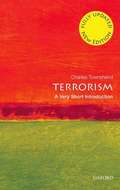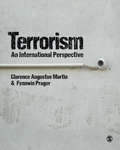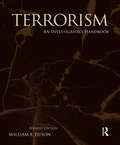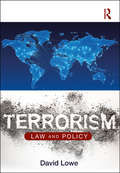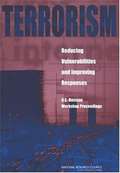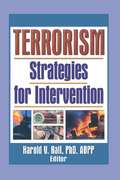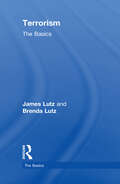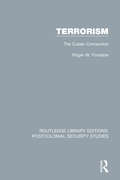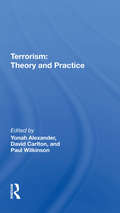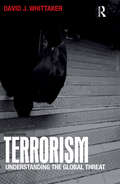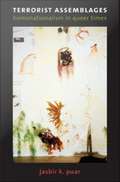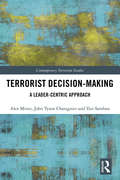- Table View
- List View
Terrorism: A Very Short Introduction
by Charles TownshendThis book charts a path through the outpouring of efforts to understand and explain modern terrorism, by asking what makes terrorism different from other forms of political, military action; what makes it effective; and what can be done about it. It unravels complex central questions such as whether terrorists are criminals, whether terrorism is a kind of war, what kind of threat terrorism represents, how far media publicity sustains terrorism, and whether democracy is especially vulnerable to terrorist attack. It examines the historical ideological and local roots of terrorist violence, and the success of specific terrorist and anti-terrorist campaigns in the more distant as well as the recent past.
Terrorism: All That Matters (All That Matters)
by Andrew SilkeDOES TERRORISM WORK?Terrorism is surrounded by myths. One of the most enduring of these myths and half-truths is that terrorism never works; that in the end, the state will prevail and the terrorists will either be dead or imprisoned or otherwise forced to end their campaign of violence. It is true that most terrorist groups are beaten. Within twelve months of their first attack most terrorist groups have been crushed. Within ten years half of the rest have been beaten. However, a small proportion - roughly one group in twenty - endures and incredibly goes on to win the conflict and beat the governments opposing them. This book is about these triumphs of terror, how and why they happen and what the beaten governments could and should have done differently. It is a book about blunders and miscalculations, of the danger of underestimating a weak enemy and the hubris of empire. It encompasses tales of courage and despair, ruthlessness and tragedy, brutality and hope. In the end, it represents not just one but many warnings from history. About the care that is needed when confronted with terrorism and about just how badly events can go for even the most powerful state if they get it wrong.ABOUT THE SERIESAll That Matters books are written by the world's leading experts to introduce the most exciting and relevant topics in an accessible, readable way. From Bioethics to Future Cities and Philosophy to Terrorism, the All That Matters series covers controversial and engaging subjects from science, philosophy, history, religion and politics. The authors are world-class academics or leading public intellectuals, on a mission to bring the most interesting and challenging areas of their subject to new readers.
Terrorism: All That Matters (Atm Ser.)
by Andrew SilkeTerrorism is surrounded by myths. One of the most enduring of these myths and half-truths is that terrorism never works. In the end, the state will prevail and the terrorists will either be dead or imprisoned or otherwise forced to end their campaign of violence. It is true that most terrorist groups are beaten. Within twelve months of their first attack most terrorist groups have been crushed. Within ten years half of the rest have been beaten. However, a small proportion - roughly one group in twenty - endures and incredibly goes on to win the conflict and beat the governments opposing them. This book is about these triumphs of terror, how and why they happen and what the beaten governments could and should have done differently. It is a book about blunders and miscalculations, of the danger of underestimating a weak enemy and the hubris of empire. It encompasses tales of courage and despair, ruthlessness and tragedy, brutality and hope. In the end, it represents not just one but many warnings from history. About the care that is needed when confronted with terrorism and about just how badly events can go for even the most powerful state if they get it wrong.
Terrorism: An International Perspective
by Fynnwin Prager Gus MartinA comprehensive investigation of modern terrorism and the global terrorist environment. The book uses a multidisciplinary approach and discusses an array of global case studies from the ideology of ISIS, to the Orlando Mass Shooting, and State-Sponsored Terrorism in Iran and Pakistan, to provide readers with an in-depth account of international terrorist violence, from its emergence through to events taking place today. Key topics examined in the book include: The Causes of Terrorism Terrorist Violence and the Role of the Media Cyberterrorism Gender-Selective Terrorism The Lone Wolf Theory The Future of Terrorism The book is supported by lecturer specific online resources, including: PowerPoint slides for each chapter, a sample syllabus, and a list of films, documentaries and journal articles linked to theories outlined in the text. Suitable reading for students studying Terrorism, International Terrorism, and Counter-terrorism.
Terrorism: An International Perspective
by Fynnwin Prager Gus MartinA comprehensive investigation of modern terrorism and the global terrorist environment. The book uses a multidisciplinary approach and discusses an array of global case studies from the ideology of ISIS, to the Orlando Mass Shooting, and State-Sponsored Terrorism in Iran and Pakistan, to provide readers with an in-depth account of international terrorist violence, from its emergence through to events taking place today. Key topics examined in the book include: The Causes of Terrorism Terrorist Violence and the Role of the Media Cyberterrorism Gender-Selective Terrorism The Lone Wolf Theory The Future of Terrorism The book is supported by lecturer specific online resources, including: PowerPoint slides for each chapter, a sample syllabus, and a list of films, documentaries and journal articles linked to theories outlined in the text. Suitable reading for students studying Terrorism, International Terrorism, and Counter-terrorism.
Terrorism: An Investigator's Handbook
by William E. DysonThis handbook introduces the reader to the field of terrorism investigation. Describing how terrorists operate and how they differ from other criminals, it provides an outline of how terrorism investigations should be conducted. By helping investigators to develop skills and knowledge, this guide helps them to prepare prosecutable cases against terrorists.
Terrorism: Assassins to Zealots
by Sean Kendall Anderson Stephen SloanStudying terrorism has been complicated by a continuing debate over defining the nature and scope of terrorism. The overused saying "one man's terrorist is another man's freedom fighter" shows how subjectivity has obscured clearly identifying terrorism without which there can be no systematic study of this matter. The first common element of terrorism is the use, or threat, of violence. The intent to generate fear is the second common element that distinguishes terrorist violence from other forms of violence. Terrorism, is a form of "armed propaganda," a potent way to communicate a message in an age dominated by the mass media.
Terrorism: Law and Policy
by David LoweTerrorism: Law and Policy provides a comprehensive socio-legal analysis of issues related to terrorist activity. Aimed at both undergraduate and postgraduate students, the book takes a comparative approach to the law related to terrorism in a number of states, mainly those in Europe, North America, Australia and New Zealand. Beginning with an examination of the background to various currently active terrorist groups, the book focuses on those groups which are currently active and which pose a threat to security, especially at the international level. The chapters take the reader through the legal definitions of terrorism contained in various states’ statutory provisions and examine how the courts have interpreted terrorism in those states’ jurisdictions. The main aim of any terrorist investigation is prevention and so the book examines the various statutory preventative measures that states have introduced and explores the legal issues surrounding surveillance, terrorism intelligence exchange, radicalisation, use of social media, quasi-criminal provisions, asset-freezing and the nexus between terrorist activity and organised crime. Bringing together a number of themes related to terrorism and security from a uniquely legal perspective, this book builds a comparative picture of the legal counter-terrorism interventions states are adopting to increase co-operation and adopt a more united approach in the face of the international terrorism threat.
Terrorism: Reducing Vulnerabilities And Improving Responses
by the United States Committee on Counterterrorism Challenges for RussiaThis book is devoted primarily to papers prepared by American and Russian specialists on cyber terrorism and urban terrorism. It also includes papers on biological and radiological terrorism from the American and Russian perspectives. Of particular interest are the discussions of the hostage situation at Dubrovko in Moscow, the damge inflicted in New York during the attacks on 9/11, and Russian priorities in addressing cyber terrorism.
Terrorism: Strategies for Intervention
by Harold Hall VAn essential resource for anyone working against terrorism in any form it may take! Written for threat assessment professionals in the post-9/11 era, this timely book will help you understand the motivation to commit acts of terror, the thinking patterns common to many terrorists, the psychology of Muslim fundamentalists, methods for predicting the likelihood of chemical/biological attacks, and a great deal more. You&’ll learn about hostage/barricade situations and the role of the crisis negotiator, including victim/perpetrator psychology and factors that indicate progress is being made in a crisis negotiation and factors that imply imminent lethality. After reading Terrorism: Strategies for Intervention, you&’ll have a better understanding of: biological, social, and psychological constructs that are important to understanding group violence the role of emotions in violence the history of chemical/biological weapons use from 1978 to the present, and methods of predicting the likelihood and origins of such attacks the importance of concurrent sequences in relation to chemical/biological attacks hostage/barricade situations, the makeup of crisis negotiation teams, and the role of the crisis negotiator hostage incident databases-where to find them, what they contain, and how they can be used effectively six different types of hostage takers and what strategies have the best chance of bringing each type&’s crises to an end factors that indicate progress is being made in a crisis negotiation and factors that imply imminent lethality ethical concerns for forensic consultants when dealing with the issues surrounding terrorism Here is a sample of what you&’ll find in this informative and well-referenced book: "Terrorism as Group Violence" illustrates the complexity of terrorism and the need to consider the interplay of biological, social, and psychological influences on terrorist behavior. This chapter identifies the constructs and data generated by theories of violence that are relevant to terrorism. Next, profiles of terrorists&’ motivations are scrutinized, followed by a probing of the specific patterns of thinking salient to their motivations. Finally, approaches to solving the terrorist problem are framed. Five handy tables make important points easy to access and understand. "Chemical and Biological Violence: Predictive Patterns in State and Terrorist Behavior" is essential reading for any serious evaluator of chemical and biological weapons. This chapter uses the Lethal Violence Sequence as a means to help predict chemical/biological weapons use by religious and ethno-nationalist terrorist groups. It includes case vignettes, data categories that can help make predictions more accurate, and a discussion of solutions for use by individuals, law enforcement and federal anti-terrorist agencies, as well as manufacturers and other industry entities, plus a consideration of government and international efforts. "Negotiating Crises: The Evolution of Hostage/Barricade Crisis Negotiations" examines multiple ways by which a crisis incident can be classified, analyzes the results of hostage incident databases, discusses negotiation techniques, and explores the impact of captivity on the victim. The author reveals important characteristics of hostage/barricade situations that can be vital to the success of the evaluator/negotiator. Six informative tables in this section make statistics and procedures easy to understand. "Ethical Concerns in Forensic Consultation Regarding National Safety and Security" provides an essential overview of the ethical challenges that mental health professionals and behavioral scientists face when they consult on matters of national security and safety. This chapter delivers useful guidance for professionals who
Terrorism: The Basics (The Basics)
by James Lutz Brenda J LutzTerrorism: The Basics is an ideal starting point for anyone interested in one of the most discussed, written about and analysed aspects of modern life. Common misconceptions are dispelled as the authors provide clear and jargon-free answers to the big questions: What does terrorism involve? Who can be classified as a terrorist? What are terrorists trying to achieve? Who are the supporters of terrorism? Can there ever be an end to terrorist activity? These questions and more are answered with reference to contemporary groups and situations allowing readers to relate theory to what they have seen on the news. Written with clarity and insight, this book is the perfect first book on terrorism for students of all levels.
Terrorism: The Basics (The Basics)
by Brenda Lutz James LutzTerrorism: The Basics is an ideal starting point for anyone interested in one of the most discussed, written about and analysed aspects of modern life. Common misconceptions are dispelled as the authors provide clear and jargon-free answers to the big questions: What does terrorism involve? Who can be classified as a terrorist? What are terrorists trying to achieve? Who are the supporters of terrorism? Can there ever be an end to terrorist activity? These questions and more are answered with reference to contemporary groups and situations allowing readers to relate theory to what they have seen on the news. Written with clarity and insight, this book is the perfect first book on terrorism for students of all levels.
Terrorism: The Cuban Connection
by Roger W. FontaineFirst published in 1988, Terrorism: The Cuban Connection examines Cuba’s involvement in terrorism. With a focus on Havana, the book begins by looking at Cuba’s history and the origins of terrorism. As it progresses, the book traces the development of terrorism and explores Cuba’s connections with other parts of the world, including America, Russia, the Caribbean, South America, the Middle East, and Sub-Saharan Africa. Terrorism: The Cuban Connection is a detailed study, equipped with a wealth of key documents and photographs.
Terrorism: Theirs & Ours (Open Media Series)
by David Barsamian Eqbal AhmadIn 1985, President Ronald Reagan received a group of bearded turban-wearing men who looked like they came from another century. After receiving them in the White House, Reagan spoke to the press, referring to his foreign guests as "freedom fighters." These were the Afghan mujahideen. In August 1998, another American president ordered missile strikes from the American navy based in the Indian Ocean to kill Osama bin Laden and his men in the camps in Afghanistan. The terrorist of yesterday is the hero of today, and the hero of yesterday becomes the terrorist of today. In Terrorism: Theirs and Ours, Eqbal Ahmad holds up the concepts of "terrorist" and "freedom fighter" to U.S. foreign policy. What do these terms mean? Where do they apply? How can the roots of political violence be stemmed? An invaluable primer.
Terrorism: Theory And Practice
by Lewis M AlexanderThe study of terrorism has now "arrived" internationally, as evidenced by the birth of a new international multidisciplinary journal, Terrorism; the proliferation of scientific conferences and papers; and the growth of university research and teaching on the subject. Historians, social scientists, lawyers, criminologists, administrators, and political leaders are showing an increasing awareness of the need for more informed scholarly analysis of the growing international incidence of acts of terrorism perpetrated by extremist groups of almost every ideological hue and in every continent.
Terrorism: Understanding the Global Threat (Routledge Readers In History Ser.)
by David WhittakerWhat is terrorism and where does it come from? Who are the people who perpetrate terror? What are their motives? Terrorism is now everybody's major and constant fear. This easy-to-read, concise account of terrorism provides the essential global guide to understanding what the threat is and exactly where it comes from. Without this knowledge, argues David Whittaker, there can be no way forward in prevention and control. The book looks in particular at how terrorism has shaped and been shaped by the past half century, the driving forces behind it, the methods, the psychology and the money. Originally written in the aftermath of September 11, the book has now been updated to reflect how our understanding of and reaction to terrorism has moved on in the past few years. The Where to Find Out More section at the end will also be thoroughly updated to include recent websites and publications on the subject.
Terrorismus als Kommunikation: Bestandsaufnahme, Erklärungen und Herausforderungen (Aktivismus- und Propagandaforschung)
by Liane RothenbergerKommunikationstheorien und Terrorismus – wie lässt sich hier eine Verbindung schaffen? Terrorismus ist ein in der heutigen Zeit dominantes Thema: Es bestimmt zuweilen die öffentliche politische Diskussion wie auch private Gespräche. Die Kommunikationswissenschaft kann dazu beitragen, das Phänomen Terrorismus weiter zu durchdringen, und wichtige Puzzlesteine liefern, es in seiner Gesamtheit zu erfassen. Die Entwicklung der Medienkompetenz mancher Terroristengruppen drängt es geradezu auf, das „Gesellschaftsproblem Terrorismus“ mithilfe einer „kommunikationswissenschaftlichen Brille“ anzugehen.
Terrorismus als hybride Bedrohung des 21. Jahrhunderts: Akteure, Mittel Und Die Notwendigkeit Einer Modernen Sicherheitsarchitektur In Deutschland (Sicherheit - Interdisziplinäre Perspektiven Ser.)
by Dirk Freudenberg Stefan Goertz Stephan ManingerIn diesem Sammelband untersuchen Wissenschaftler und Praktiker aus dem Politikfeld Innere Sicherheit die asymmetrische Bedrohung durch den islamistischen Terrorismus in Deutschland und leiten daraus eine dringend erforderliche Anpassung der deutschen Sicherheitsarchitektur ab.Der InhaltDas Bedrohungspotenzial durch Islamismus und islamistischen Terrorismus ● Islamistisch-terroristische Radikalisierung ● Recht als Grundlage und Schranke staatlichen Handelns bei der Bekämpfung des Terrorismus ● Terrorismusabwehr und -bekämpfung im Zeitalter strategischer Ungewissheit ● Effekte von Terrorismus und Anarchismus als Führungsproblem ● Politisch motivierte Kriminalität mit CBRN-Tatmitteln ● Reichweite und Methodenspektrum im Zeitalter islamistischer AnschlägeDie HerausgeberDr. Dirk Freudenberg ist Dozent im Referat Strategische Führung und Leitung, Notfallvorsorge und -planung, pädagogische Grundlagen und Qualitätsmanagement an der Akademie für Krisenmanagement, Notfallplanung und Zivilschutz (AKNZ) im Bundesamt für Bevölkerungsschutz- und Katastrophenhilfe (BBK).Dr. Stefan Goertz ist Beamter der Bundespolizei und Dozent an der Hochschule des Bundes, Fachbereich Bundespolizei, in Lübeck.Dr. Stephan Maninger ist Politikwissenschaftler mit zahlreichen Veröffentlichungen und Vorträgen an diversen akademischen Einrichtungen zu sicherheitspolitischen und militärgeschichtlichen Themen.
Terrorismus und Terrorismusbekämpfung
by Hendrik Hegemann Martin KahlDas Lehrbuch gibt einen differenzierten, übersichtlichen und verständlichen Überblick über Stand und Probleme des Wissens zu Terrorismus und Terrorismusbekämpfung. Terroristische Gewalt steht weiterhin hoch auf der politischen und medialen Agenda, bleibt jedoch gleichzeitig ein komplexes und schwieriges Phänomen. Entlang zentraler Fragen und Kontroversen bietet das Buch eine einführende Darstellung dazu, was Terrorismus eigentlich ist, welche Gefahr er tatsächlich darstellt, wie er sich erklären lässt und was man dagegen tun kann. Es stellt zentrale Befunde und Herausforderungen heraus und illustriert diese anschaulich mit historischen und aktuellen Beispielen.
Terrorismusabwehr: Zur Aktuellen Bedrohung Durch Den Islamistischen Terrorismus In Deutschland Und Europa
by Stefan GoertzDieses Buch analysiert mögliche Mittel und Maßnahmen zur Terrorismusabwehr in Deutschland und Europa. So werden u.a. die Akteure der Terrorismusabwehr behandelt. Es erfolgt eine dezidierte Analyse der möglichen Mittel der Terrorismusabwehr wie z.B. Videoüberwachung des öffentlichen Raumes. Außerdem behandelt dieses Buch die Thematik islamistischer Gefährder, in dem die Kategorisierung, Abschiebung, Überwachung und Präventionsprogramme analysiert werden. Ebenfalls wird die Bekämpfung der Terrorismusfinanzierung untersucht.Der InhaltAnalyse der aktuellen Bedrohung durch den islamistischen Terrorismus in Deutschland und Europa • Ausgewählte besondere Bedrohungen durch den islamistischen Terrorismus und institutionelle Antworten • Technische Mittel zur Terrorismusabwehr • Institutionelle Bekämpfung des islamistischen Terrorismus in Deutschland und Europa • Radikalisierung im Phänomenbereich Islamismus und islamistischer Terrorismus sowie PräventionDie ZielgruppenPolitikwissenschaft, Terrorismusforschung, Politische Bildung, Polizei, Nachrichtendienste, BundeswehrDer AutorDr. Stefan Goertz ist Beamter der Bundespolizei und augenblicklich Dozent für Politikwissenschaft an der Hochschule des Bundes, Fachbereich Bundespolizei, in Lübeck.
Terrorismusabwehr: Zur aktuellen Bedrohung durch den islamistischen Terrorismus in Deutschland und Europa
by Stefan GoertzDieses Buch analysiert einführend ausführlich die aktuelle und zukünftige Bedrohung durch den islamistischen Terrorismus in Deutschland und Europa. Dabei werden sowohl in Deutschland und Europa verübte als auch von den Sicherheitsbehörden verhinderte islamistische Anschläge auf ihre Taktik und Wirkmittel hin analysiert und potenzielle zukünftige Anschlagsszenarien erklärt. Auf der Ebene der Akteure, Mittel und Maßnahmen der Terrorismusabwehr werden u.a. islamistische „Gefährder“ und technische Mittel wie die Videoüberwachung des öffentlichen Raumes beleuchtet. Ausführlich wird die Bekämpfung der Terrorismusfinanzierung dargelegt und die deutschen und europäischen Institutionen der Terrorismusabwehr werden vorgestellt. Stark erweitert wurde das Kapitel sechs, „Radikalisierung im Phänomenbereich Islamismus, Salafismus und islamistischer Terrorismus sowie Prävention“. Dort wird der aktuelle Stand der deutschen und internationalen Sozialwissenschaft zur Radikalisierungsforschung dargelegt und erstmals islamistische, salafistische und jihadistische Radikalisierung in Justizvollzugsanstalten analysiert. Abschließend werden in diesem Kapitel Präventions- und Deradikalisierungsprojekte gegen Islamismus, Salafismus und islamistischen Terrorismus untersucht.
Terrorismusbekämpfung und Extremismusprävention: Eine Einführung
by Stefan Goertz Nicolas StockhammerDieses Lehrbuch bietet einen kompakten Überblick über die wesentlichen Zugänge, Spezifika und Methoden der behördlichen Terrorismusbekämpfung und der strukturellen Extremismusprävention. In verständlicher Art und Weise werden auf Basis einer aktuellen Bedrohungsanalyse durch Extremismus in Europa Grundprobleme beider Themenfelder ausgewogen dargestellt, kritisch reflektiert und auch anhand von rezenten Beispielen illustriert. Das Buch soll aufgrund seiner leicht verständlichen Struktur und der fortwährenden Aktualität des Themas ein breites Publikum von Studierenden bis hin zu Praktikerinnen und Praktikern ansprechen.
Terrorist Assemblages: Homonationalism in Queer Times
by Jasbir K. PuarIn this pathbreaking work, Jasbir K. Puar argues that configurations of sexuality, race, gender, nation, class, and ethnicity are realigning in relation to contemporary forces of securitization, counterterrorism, and nationalism. She examines how liberal politics incorporate certain queer subjects into the fold of the nation-state, through developments including the legal recognition inherent in the overturning of anti-sodomy laws and the proliferation of more mainstream representation. These incorporations have shifted many queers from their construction as figures of death (via the AIDS epidemic) to subjects tied to ideas of life and productivity (gay marriage and reproductive kinship). Puar contends, however, that this tenuous inclusion of some queer subjects depends on the production of populations of Orientalized terrorist bodies. Heteronormative ideologies that the U. S. nation-state has long relied on are now accompanied by homonormative ideologies that replicate narrow racial, class, gender, and national ideals. These "homonationalisms" are deployed to distinguish upright "properly hetero," and now "properly homo," U. S. patriots from perversely sexualized and racialized terrorist look-a-likes--especially Sikhs, Muslims, and Arabs--who are cordoned off for detention and deportation. Puar combines transnational feminist and queer theory, Foucauldian biopolitics, Deleuzian philosophy, and technoscience criticism, and draws from an extraordinary range of sources, including governmental texts, legal decisions, films, television, ethnographic data, queer media, and activist organizing materials and manifestos. Looking at various cultural events and phenomena, she highlights troublesome links between terrorism and sexuality: in feminist and queer responses to the Abu Ghraib photographs, in the triumphal responses to the Supreme Court's Lawrence decision repealing anti-sodomy laws, in the measures Sikh Americans and South Asian diasporic queers take to avoid being profiled as terrorists, and in what Puar argues is a growing Islamophobia within global queer organizing.
Terrorist Criminal Enterprises: Financing Terrorism Through Organized Crime (Praeger Security International Ser.)
by Rollie Lal Kimberley ThachukThis cohesive set of case studies collects scholarly research, policy evaluation, and field experience to explain how terrorist groups have developed into criminal enterprises. Terrorist groups have evolved from orthodox global insurgents funded by rogue sponsors into nimble and profitable transnational criminal enterprises whose motivations are not always evident. This volume seeks to explain how and why terrorist groups are often now criminal enterprises through 12 case studies of terrorist criminal enterprises written by authors who have derived their expertise on terrorism and/or organized crime from diverse sources. Terrorist groups have been chosen from different regions to provide the global coverage. Chapters describe and analyze the actors, actions, problems, and collaborations of specific terrorist criminal enterprises. Other elements discussed include links to such facilitating conditions as political culture, corruption, history, economy, and issues of governance. This work advances scholarship in the field of counterterrorism by expanding the understanding of these terrorist groups as entities not driven purely by ideology but rather by the criminal enterprises with which they often coincide. * Provides a global comparison of major terrorist groups and their engagement in organized crime * Provides in-depth analysis of regional terrorist and criminal groups * Incorporates authors' expertise on regional terrorist groups and organized crime * Acknowledges a variety of opinions and perspectives
Terrorist Decision-Making: A Leader-Centric Approach (Contemporary Terrorism Studies)
by Alex Mintz Tyson Chatagnier Yair SambanThis book analyzes a series of decisions by leaders of three major terrorist organizations and identifies a unique "Decision DNA" for each of them. The authors use the Applied Decision Analysis methodology to examine organizational and operational decisions made by the leaders of three major groups: Hezbollah (Hassan Nasrallah), Hamas (Khaled Mashal), and al-Qaeda (Osama bin Laden). Decisions that were of critical importance to each organization are identified and anaylzed, to uncover the particular decision rule employed by the leader in question and to establish their "Decision DNA." A Decision DNA is unique to each leader and can be used to explain previous decisions or predict future choices. The authors demonstrate that the findings presented can be used to promote effective counterterrorism measures, and they provide a series of policy implications that arise from their examination of each leader. This book will be of much interest to students of terrorist studies, political violence, security studies, and Middle Eastern politics.
